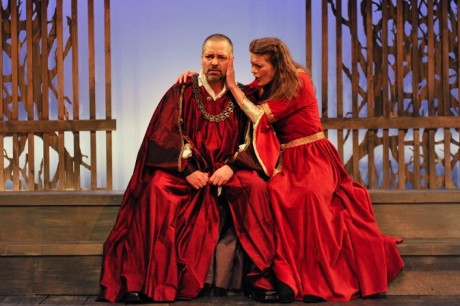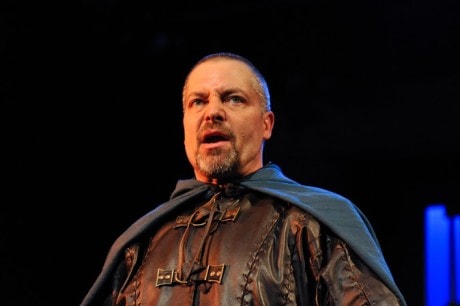When you go to see Macbeth, you probably take a few things for granted. You might expect to be impressed by the splendor and beauty of Shakespeare’s language, and you might expect to be drawn into a classic tale of how the hunger for power can turn horribly wrong. The Philadelphia Shakespeare Theatre’s Macbeth provides all of that – it’s an exceedingly well-done production. But it also gave me a point of view I hadn’t been expecting.

The pivotal moment comes late in the first half of director Carmen Khan’s production. Macbeth, with support and collaboration from his wife, has already begun his power-mad killing spree. He’s killed the King of Scotland (in order to take over the throne himself), and he’s killed a few guards he blamed for the killing. He’s even had his longtime friend Banquo killed in order to quell any possible challenges to his throne. Now Macbeth and Lady Macbeth are throwing a royal banquet, but an unexpected guest arrives: Banquo’s ghost, whose mere appearance turns the brave new king into a quivering mess, overcome with fear.
Usually this scene is staged the way Shakespeare wrote it: “The Ghost of Banquo enters, and sits in Macbeth’s place.” This time, though, the ghost never appears to us; Macbeth is the only one who can see him. (Which makes sense; after all, if we don’t see a dagger floating through the air when Macbeth says “Is this a dagger which I see before me,” why should we see the ghost?)
As a result, instead of seeing the ghost terrorize Macbeth, we see the scene through Lady Macbeth’s eyes. As her husband is convulsed in wide-eyed terror, bellowing in rage at an invisible apparition, she sees for the first time just how becoming a murderer has transformed him into a madman. At the same time, she must repeatedly apologize to her guests, trying to cover for him and pretend that nothing’s wrong. She has stoked his obsession with power, but in this scene, for the first time, she comes to realize that she can’t control him. It’s a marvelous moment, and it’s typical of Khan’s production, which showcases a pair of explosive lead performances.
Rob Kahn’s Macbeth is threatening and imposing, with an intense gaze that bores into the eyes of anyone who dares to come close. He’s angry when he fails to get his way, and he’s even angry when he succeeds. Even in his poignant final soliloquy (“Out, out, brief candle!”), he’s so furious that he barely takes a moment to grieve. When he says that life “is a tale / Told by an idiot,” he shouts the word idiot at the sky, at an absent God. Even in his last moments, he can’t help but blame everybody but himself for his troubles.
Annabel Capper’s Lady Macbeth is full of rage, too. But she plays her opening soliloquy so much over-the-top intensity – fingers and head trembling furiously, voice blaring – that she seems less power-hungry than peculiar. Yet any doubts disappear about Capper’s performance disappear when Macbeth enters at the end of the scene. It immediately becomes clear that these two are an excellent match, and that in Macbeth, Lady Macbeth has found the perfect instrument to carry out her plan for power. These two passionate performances complement each other quite well.

The rest of the ensemble delivers fine support, with rich voices that show a strong facility with Shakespearean diction. Standouts include William LeDent (as Macduff) and Josh Kchnycz (Malcolm), who share a strong dramatic moment, and Jenna Kuerzi, who brings a human touch to the role of Macduff’s son. And Eric Van Wie gives Banquo a haunting, admirable nobility. Van Wie also the Porter in the play’s only comic scene, but despite his best efforts, the scene doesn’t work here – though it also hasn’t worked in most productions of Macbeth I’ve seen (it’s confusing, revolves around a character who doesn’t appear in any other scenes, and comes so quickly after a murder that the audience hasn’t had time to recover).
Fabian Obispo’s music – a low electronic rumble that permeates nearly every scene, punctuated by tribal drums – contributes splendidly to the production’s ominous tone. Vickie Esposito’s costumes – tunics and boots for the men, austere robes for the women – provide a discreetly elegant look. Michael Lambui’s lighting is used effectively to set off the soliloquies. And Michael Cosenza’s fight choreography – lots of swordfights, grunting, and a vicious attack on Macduff’s family – adds to the sense of danger.
Running Time: Two hours and 20 minutes, including an intermission.
Macbeth plays through May 21, 2016, in repertory with Twelfth Night (which opens on April 15th), at The Philadelphia Shakespeare Theatre – 2111 Sansom Street, in Philadelphia, PA. For tickets, call the box office at (215) 496-8001, or purchase them online.




